Table Of Contents
- Technical Evolution: From Concept to Commercialization
- 5G Connectivity
- Vehicle-to-Everything (V2X) Communication
- Artificial Intelligence (AI) and Machine Learning
- Cybersecurity Measures: Protecting Against Emerging Threats
- Advanced Driver-Assistance Systems (ADAS)
- Technology Adoption
- Rise in Trend of Connectivity Solution
- Ease of Vehicle Diagnosis
- Increase in Need of Safety & Security
- Key Takeaways

Lalit Janardhan Katare

Koyel Ghosh
Driving Toward Connectivity: The Latest Developments in Connected Car Technology

Connected car facilitates connectivity on wheels offering comfort, convenience, performance, safety, and security along with powerful network technology. This enables the driver to connect with online platforms, thereby facilitating real-time communication. Over time, various connectivity solutions have been developed by car manufacturers and service providers, such as the machine-to-machine (M2M) connectivity platform. This M2M feature in a car enables interconnectivity between two connected cars. The car is equipped with numerous sensors and processors, which provide accurate and real-time information to the driver. This in turn fuels the adoption of connected cars across the globe.
Technical Evolution: From Concept to Commercialization
In recent years, the automotive industry has witnessed a remarkable transformation driven by the rapid advancement of connected car technology. From integrated infotainment systems to autonomous driving capabilities, vehicles are becoming more connected than ever before, reshaping the way we drive and interact with our vehicles.
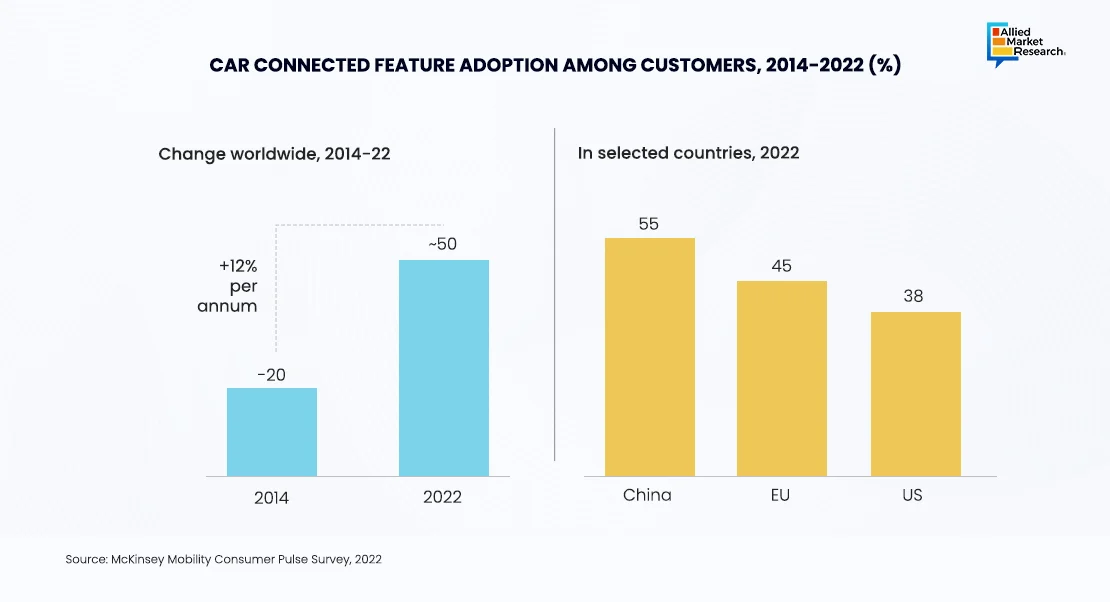
Across the article, latest developments and trends in connected car technology, highlighting the innovations that are driving the consumer toward a more connected future on the roads have been mentioned. This includes some of the technologies mentioned below.
5G Connectivity
One of the most significant developments in connected car technology is the integration of 5G connectivity. With its ultra-fast speeds, low latency, and high reliability, 5G technology has the potential to revolutionize the way vehicles communicate with each other and with the surrounding infrastructure. This enables real-time data exchange, faster software updates, and seamless integration with cloud-based services. Such features offered by 5G connectivity have enhanced the overall driving experience in the connected vehicles and paved the way for advanced autonomous driving capabilities.
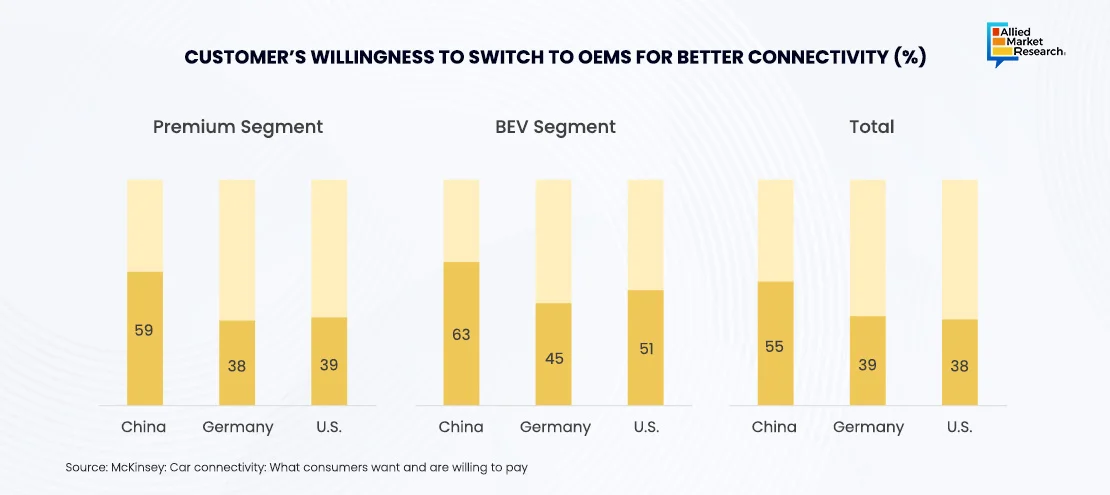
Vehicle-to-Everything (V2X) Communication
A significant emerging trend in connected car technology revolves around the integration of Vehicle-to-Everything (V2X) communication. This innovative technology empowers vehicles to establish seamless communication channels not only with fellow vehicles but also with pedestrians and roadside infrastructure. Through these interconnected networks, vital data concerning road conditions, traffic flow, and potential dangers are exchanged in real-time. Harnessing the capabilities of V2X communication allows connected vehicles to adeptly adapt to dynamic road scenarios, thereby enhancing safety measures and mitigating the likelihood of accidents.
Artificial Intelligence (AI) and Machine Learning
Artificial intelligence (AI) and machine learning are playing an increasingly important role in connected car technology. Advanced AI algorithms analyze vast amounts of data collected from sensors, cameras, and other onboard devices to make intelligent decisions in real-time. From autonomous driving algorithms to personalized driver assistance systems, AI-powered technologies enhance the capabilities of connected cars. Additionally, AI-powered technologies are enhancing connected cars, making them smarter, safer, and more efficient, thus improving their performance and reliability on the roads. One such example is Audi's AI Traffic Jam Pilot, introduced in 2017. This system utilizes AI and machine learning algorithms to enable autonomous driving in congested traffic conditions. By analyzing data from onboard sensors and cameras, Audi's AI Traffic Jam Pilot enhances driver convenience and safety during traffic jams, showcasing the integration of AI-powered technologies in connected cars.
Cybersecurity Measures: Protecting Against Emerging Threats
As cars get more connected, cybersecurity becomes more important. Automakers are investing in robust security measures, such as encrypted communication protocols, intrusion detection systems, and over-the-air security updates, to protect against cyber threats and ensure the integrity of connected car systems. By prioritizing cybersecurity, automakers are working to build trust and confidence in connected car technology among consumers. Furthermore, cybersecurity measures among connected vehicles offers essential protection against cyber threats, ensuring data privacy, preventing unauthorized access, enhancing safety, and maintaining trust in vehicle reliability. For instance, in 2023, Tesla implemented advanced security measures including encrypted communication protocols and over-the-air security updates to safeguard its connected car systems from cyber threats.
Advanced Driver-Assistance Systems (ADAS)
Connected cars are equipped with advanced driver-assistance systems (ADAS) that leverage sensor fusion, computer vision, and AI to enhance safety and convenience for drivers. These systems include features such as adaptive cruise control, lane-keeping assist, automatic emergency braking, and parking assistance, which help drivers navigate traffic, avoid collisions, and park with ease. As ADAS technologies continue to evolve, connected cars are becoming increasingly capable of assisting drivers in a wide range of driving scenarios, from highway cruising to urban maneuvering.
Furthermore, ADAS and connected car technologies are closely related and often work together to enhance vehicle safety, efficiency, and overall driving experience. This includes data exchange, enhanced awareness, fleet learning and updates, predictive capabilities, vehicle communication among others. ADAS and connected car technologies complement each other by controlling data exchange, enhancing situational awareness, enabling fleet learning and updates, facilitating predictive capabilities, and influencing V2X communication to improve overall vehicle safety, efficiency, and driving experience.
North America Connected Car Analysis: North America is the second dominant market for connected car infrastructure due to the presence of numerous players which are indulged toward offering connected car features across vehicles. For example, GM vehicles equipped with OnStar services utilize AT&T's network for connectivity, enabling features such as remote diagnostics, vehicle tracking, and in-car Wi-Fi hotspot capabilities.
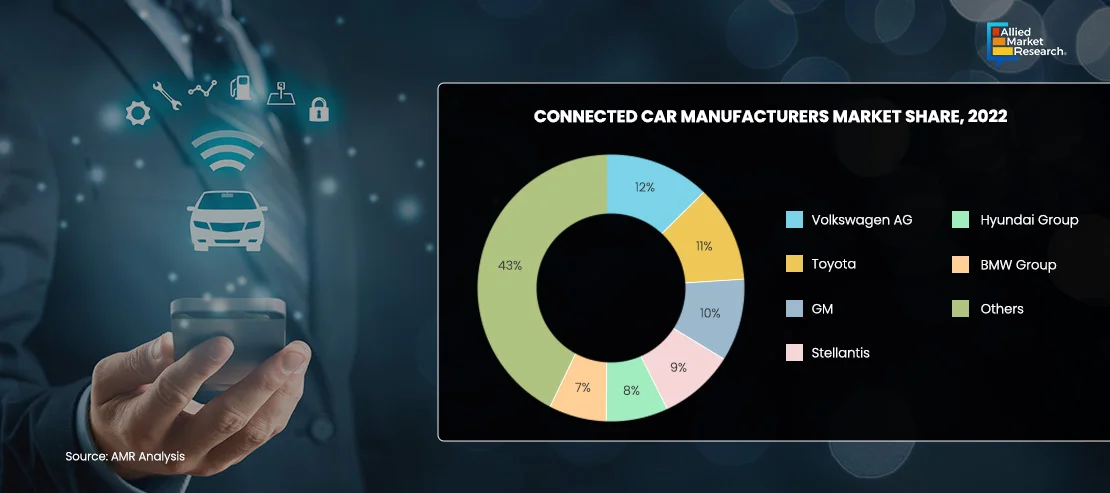
Europe Connected Car Analysis: Europe is the leader in the connected car infrastructure due to the developments carried out by the key players operating in the industry. Furthermore, the developments have been carried out by top companies to offer better and more efficient connected car services thus leading to the growth of the connected car industry across Europe. Also, the introduction of advanced features such as ADAS has enabled vehicle manufacturers to offer connected services in vehicles across the continent. Bosch's integration of this system is one such example.
Asia-Pacific Connected Car Analysis: Asia-Pacific holds a considerable market share in the global connected car ecosystem due to the increased production of vehicles equipped with advanced components & features. Moreover, major companies in the region are actively developing vehicle-specific technologies, leading to broader adoption of advanced vehicles across the area. For instance, Toyota's launch of the "Connected Services" platform in 2023 showcases the region's commitment to advancing vehicle technology.
Technology Adoption
Despite initial hurdles, the adoption of connected vehicles is gaining momentum worldwide. Markets such as Japan, South Korea, and Germany have emerged as early adopters, investing in infrastructure development and incentivizing consumer adoption through subsidies and tax incentives.
Rise in Trend of Connectivity Solution
Smartphones have changed the definition of connectivity over time. People wish to stay connected with the outer world even while travelling. Now that connectivity has become the need of the hour, automobile manufacturers adopt connectivity solutions in their vehicles to boost their automobile sales. Consumers are expecting their vehicles to perform tasks similar to computers and smart phones.
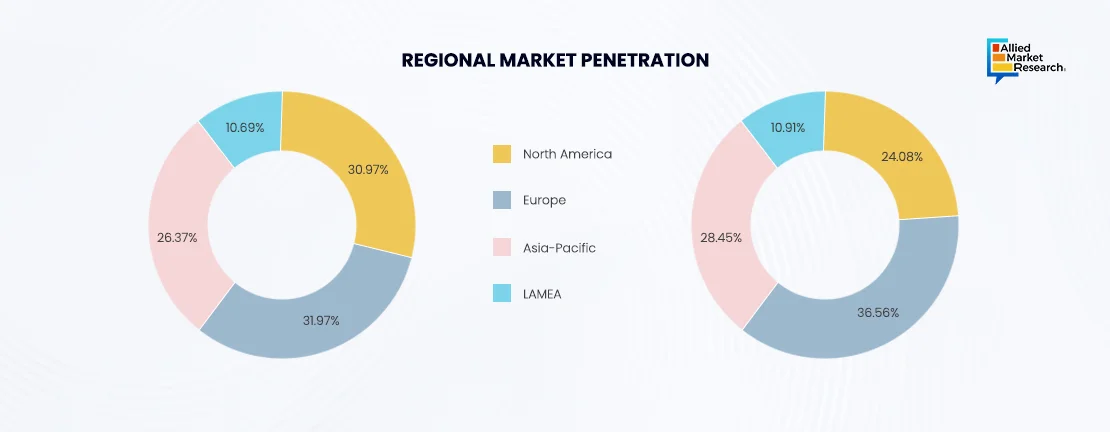
Adding connectivity solutions in the vehicle has become the topmost priority for automobile manufacturers. Many connectivity solutions are integrated in modern cars that require internet service to perform their respective functions. Connectivity can be provided in a car using embedded, integrated, or tethered connectivity solutions. One of these connectivity solutions is used to offer internet connection to the driver as well as the passengers who travel in the vehicle. An in-car hotspot can be created to provide internet access to all the devices within the vehicle with the help of a smart phone, modem, or connectivity device. Thus, the rise in trend of connectivity solutions has created a broader scope for the connected cars industry to grow in the near future.
Ease of Vehicle Diagnosis
Advance diagnostic system has directly contributed to the connected cars market growth. In advanced diagnostics, the car's system supplies vehicle data to both the automobile dealer and the customer, helping predict potential automobile issues before they occur. In fleet management, it is easy to track vehicle records and decide which vehicle has travelled the most and accordingly offer service with the help of connectivity solutions. The diagnostic service offered is an efficient way to diagnose the status of the vehicles. It allows the consumers to manage the maintenance of their vehicle, thus saving money and time by avoiding unwanted expenses & breakdowns. The system provides a maintenance schedule and timely reminders to the consumer. The diagnostic system keeps track of the smoke emission and fuel consumption of the vehicles, thereby monitoring its engine health. The diagnostic service sends a detailed report about the vehicle to the decision maker who decides on the service schedules for the automobile. Thus, the ease of vehicle diagnosis with the help of mobile applications creates a direct impact toward the adoption of connected features among vehicles.
Increase in Need of Safety & Security
Safety and security are important aspects that boost the connected car infrastructure. This aspect has always been crucial from the perspective of the consumers as well as the auto manufacturers. In case of accidents, these cars can send an SOS message along with the coordinates of the driver’s location. In case of theft, the owners can track their vehicle instantly using a smart phone app developed for this purpose. Therefore, the increase in need of safety and security among vehicles has positively impacted the growth of connected car industry across countries.
Key Takeaways
Connected car technology is reshaping the automotive industry, driving us toward a future where our vehicles are more than just modes of transportation—they are fully integrated digital platforms. From enhanced safety features to personalized infotainment systems, the latest developments in connected car technology are revolutionizing the driving experience.
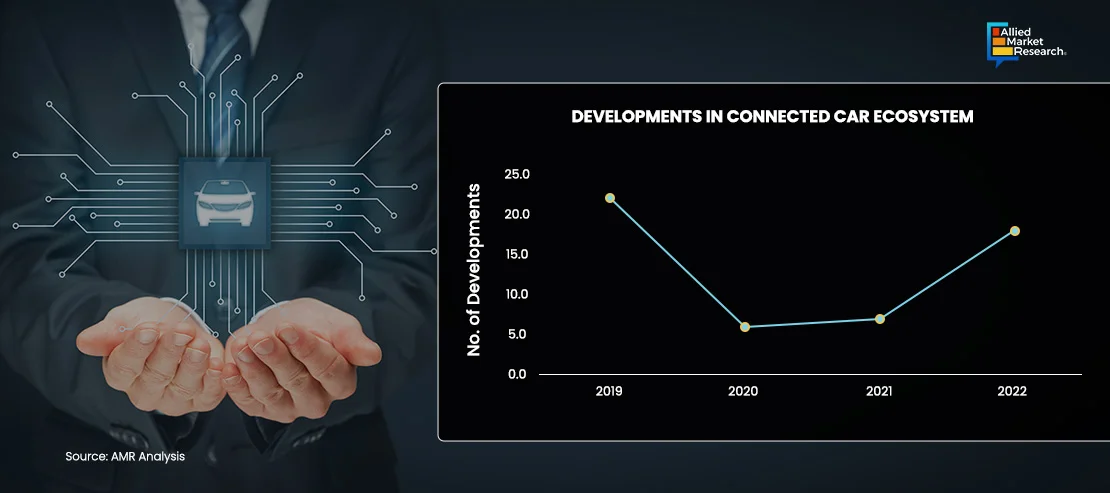
Allied Market Research aims to equip stakeholders with comprehensive knowledge about the developments in connected car technology within the automotive industry. By understanding this practice, vendors can strategically position themselves to make the most of its benefits. We encourage OEMs and service providers to explore opportunities for integrating connected vehicle features into their offerings, leveraging its capabilities to enhance efficiency, mitigate risks, and ultimately drive success in an evolving marketplace. Embracing this innovative approach will not only optimize operations but also foster growth and competitive advantage in the dynamic landscape across automotive industry. For more insights into connected car features and its impact on the automotive industry, contact our specialists today!

